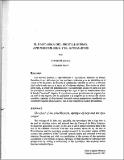Por favor, use este identificador para citar o enlazar a este item:
http://hdl.handle.net/10261/16116COMPARTIR / EXPORTAR:
 SHARE
BASE SHARE
BASE
|
|
| Visualizar otros formatos: MARC | Dublin Core | RDF | ORE | MODS | METS | DIDL | DATACITE | |

| Campo DC | Valor | Lengua/Idioma |
|---|---|---|
| dc.contributor.author | Barcala, Andrés | - |
| dc.date.accessioned | 2009-08-20T12:57:18Z | - |
| dc.date.available | 2009-08-20T12:57:18Z | - |
| dc.date.issued | 1997 | - |
| dc.identifier.citation | Hispania sacra, Vol. 49, Nº 99, 1997, pags. 327-348 | en_US |
| dc.identifier.issn | 0018-215X | - |
| dc.identifier.uri | http://hdl.handle.net/10261/16116 | - |
| dc.description.abstract | [ES] Los escritos joaneos, y especialmente el Apocalipsis, tardaron un tiempo llamativo en ser utilizados por los escritores cristianos y en ser admitidos en el canon de las Escrituras. En España la resistencia a estudiar su texto y a utilizarlo duró todavía más que en el resto del Occidente cristiano. Este hecho se debió, sobre todo, al temor del priscilianisrno y al estereotipo creado en tomo a él por los principales escritores y heresiólogos del siglo V, que lo consideraron como la herejía "nacional" hispana, lo vincularon con un gnosticismo sin vigencia hacia más de dos siglos y con la asociación a la exegesis de la ciencia del cálculo numérico. Apringio de Beja intentó introducir nuevas perspectivas, escribiendo un comentario seguido al Apocalipsis, para lo que disponía de escasos precedentes. | en_US |
| dc.description.abstract | [EN] The writings of St. John and, specially, the Apocalypse take a long time to he used bv chnstian writers and admited into the Canon of the Holv Scrioture. In Spain &e opposition to study its text and to uie it lasted even moré than in the rest of the chnstian Occident. This fact was caused, above all, bv the fear of Priscilliani>ni snd ihe stcreotypc created around ii by ihc prime whten of lihh ccntury tliai consiJer~di t thc "ndtional" spanish heresy and conccted it with and obsolete Gnosticism and with tere application of the science of the numerical caículation to the biblical exegesis. Apringio of Beja intented to inboduce new perspectives by witing a commeutary to the Apocalipse, that anybody before him had wanted in Spain. | en_US |
| dc.format.extent | 1643688 bytes | - |
| dc.format.mimetype | application/pdf | - |
| dc.language.iso | spa | en_US |
| dc.publisher | Consejo Superior de Investigaciones Científicas (España) | en_US |
| dc.rights | openAccess | en_US |
| dc.subject | Historia de las religiones | en_US |
| dc.subject | Cristianismo | en_US |
| dc.subject | Alta Edad Media | en_US |
| dc.subject | España | en_US |
| dc.subject | Apocalipsis | en_US |
| dc.subject | Priscilianismo | en_US |
| dc.title | El fantasma del priscilianismo, Apringio de Beja y el Apocalipsis | en_US |
| dc.title.alternative | The ghost of the priscillianism, apringio of Beja and the Apocalipse | en_US |
| dc.type | artículo | en_US |
| dc.description.peerreviewed | Peer reviewed | en_US |
| dc.identifier.e-issn | 1988-303X | - |
| dc.type.coar | http://purl.org/coar/resource_type/c_6501 | es_ES |
| item.fulltext | With Fulltext | - |
| item.languageiso639-1 | es | - |
| item.openairecristype | http://purl.org/coar/resource_type/c_18cf | - |
| item.openairetype | artículo | - |
| item.cerifentitytype | Publications | - |
| item.grantfulltext | open | - |
| Aparece en las colecciones: | (CCHS-IH) Artículos | |
Ficheros en este ítem:
| Fichero | Descripción | Tamaño | Formato | |
|---|---|---|---|---|
| 20090728144938594.pdf | 1,61 MB | Adobe PDF |  Visualizar/Abrir |
CORE Recommender
Page view(s)
422
checked on 23-abr-2024
Download(s)
269
checked on 23-abr-2024
Google ScholarTM
Check
NOTA: Los ítems de Digital.CSIC están protegidos por copyright, con todos los derechos reservados, a menos que se indique lo contrario.
